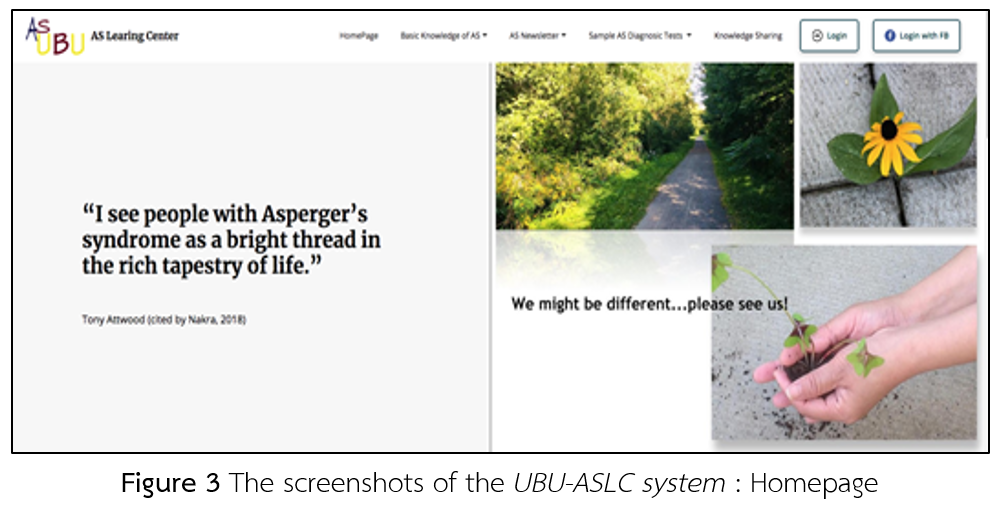การออกแบบและพัฒนาเว็บแอปพลิเคชันสำหรับสนับสนุนโปรแกรมพัฒนาวิชาชีพครูเพื่อสร้างองค์ความรู้เกี่ยวกับแอสเพอร์เกอร์ซินโดรมให้กับบุคลากรทางศึกษาไทย
Main Article Content
บทคัดย่อ
ด้วยความก้าวหน้าของการใช้เทคโนโลยีในด้านการศึกษา เทคโนโลยีสารสนเทศและการสื่อสารได้ถูกนำมาบูรณาการรวมกับโปรแกรมการพัฒนาวิชาชีพครูเพื่อให้เกิดการเข้าถึงความรู้ ความคงทนและถ่ายโอนความรู้มากขึ้น งานวิจัยนี้เป็นการนำร่องด้วยการพัฒนาเว็บแอปพลิเคชัน ชื่อว่า Ubon Ratchathani University Applied Science Learning Center ซึ่งใช้เป็นช่องทางการถ่ายทอดองค์ความรู้ของโปรแกรมการพัฒนาวิชาชีพครู เพื่อสร้างองค์ความรู้เกี่ยวกับแอสเพอร์เกอร์ซินโดรมให้กับนักการศึกษาในประเทศไทย เนื่องจากการขาดแคลนงานวิจัยและแหล่งเรียนรู้ จึงทำให้แอสเพอร์เกอร์ซินโดรมยังไม่ได้เป็นที่รู้จักมากนักในประเทศไทยเมื่อเทียบกับโรคออทิสติก ซึ่งเป็นความท้าทายให้นักการศึกษาต้องฟูมฟักนักเรียนของตนเองที่มีอาการแอสเพอร์เกอร์ซินโดรมให้มีศักยภาพที่สมบูรณ์ เว็บแอปพลิเคชันนี้พัฒนาด้วยซอฟต์แวร์ที่หลากหลายเพื่อสนับสนุนวิธีการเรียนรู้ที่หลากหลาย การวิจัยดำเนินการที่จังหวัดอุบลราชธานี ในภาคตะวันออกเฉียงเหนือของประเทศไทย กลุ่มตัวอย่างของการวิจัย ได้แก่ ครูประจำการ และนักศึกษาที่เรียนวิชาชีพครู ผู้ซึ่งมีความสนใจอย่างมากในการเรียนรู้เกี่ยวกับแอสเพอร์เกอร์ซินโดรม ผลการวิจัย พบว่า เว็บแอปพลิเคชันเป็นองค์ประกอบที่สำคัญในโปรแกรมการพัฒนาวิชาชีพครู สามารถพัฒนาความคงทนในการเรียนรู้ และยังส่งเสริมการสร้างชุมชนการเรียนรู้อย่างมืออาชีพของคณะครู
Article Details

อนุญาตภายใต้เงื่อนไข Creative Commons Attribution-NonCommercial-NoDerivatives 4.0 International License.
วารสารวิทยาศาสตร์และวิทยาศาสตร์ศึกษา (JSSE) เป็นผู้ถือลิสิทธิ์บทความทุกบทความที่เผยแพร่ใน JSSE นี้ ทั้งนี้ ผู้เขียนจะต้องส่งแบบโอนลิขสิทธิ์บทความฉบับที่มีรายมือชื่อของผู้เขียนหลักหรือผู้ที่ได้รับมอบอำนาจแทนผู้เขียนทุกนให้กับ JSSE ก่อนที่บทความจะมีการเผยแพร่ผ่านเว็บไซต์ของวารสาร
แบบโอนลิขสิทธิ์บทความ (Copyright Transfer Form)
ทางวารสาร JSSE ได้กำหนดให้มีการกรอกแบบโอนลิขสิทธิ์บทความให้ครบถ้วนและส่งมายังกองบรรณาธิการในข้อมูลเสริม (supplementary data) พร้อมกับนิพนธ์ต้นฉบับ (manuscript) ที่ส่งมาขอรับการตีพิมพ์ ทั้งนี้ ผู้เขียนหลัก (corresponding authors) หรือผู้รับมอบอำนาจ (ในฐานะตัวแทนของผู้เขียนทุกคน) สามารถดำเนินการโอนลิขสิทธิ์บทความแทนผู้เขียนทั้งหมดได้ ซึ่งสามารถอัพโหลดไฟล์บทความต้นฉบับ (Manuscript) และไฟล์แบบโอนลิขสิทธิ์บทความ (Copyright Transfer Form) ในเมนู “Upload Submission” ดังนี้
1. อัพโหลดไฟล์บทความต้นฉบับ (Manuscript) ในเมนูย่อย Article Component > Article Text
2. อัพโหลดไฟล์แบบโอนลิขสิทธิ์บทความ (Copyright Transfer Form) ในเมนูย่อย Article Component > Other
ดาวน์โหลด ไฟล์แบบโอนลิขสิทธิ์บทความ (Copyright Transfer Form)
เอกสารอ้างอิง
Cassidy, S., Bradley, P., Robinson, J., Allison, C., McHugh. M., & Baron-Cohen, S. (2014). Suicidal ideation and suicide plans or attempts in adults with Asperger’s syndrome attending a specialist diagnostic clinic: A clinical cohort study. The Lancet Psychiatry, 1(2), 142-147.
Drigas, A. S., & Ioannidou, R.-E. (2013). Special education and ICTs. International Journal of Emerging Technologies in Learning, 8(2), 41-47.
Gallagher, S. A., & Gallagher, J. J. (2002). Gifted and Asperger’s Syndrome: A new agenda for education. Understanding Our Gifted, 14(2), 1-9.
Grandin, T. (2002). The world needs people with Asperger’s Syndrome. Cerebrum, 4(4), 73-82.
Gregson, J. A., & Sturko, P. A. (2007). Teachers as adult learners: Re-conceptualizing professional development. Journal of Adult Education, 36(1), 1-18.
Griffin, H. C., Griffin, L. W., Fitch, C. W., Albera, V., & Gingras, H. (2006). Educational interventions for individuals with Asperger Syndrome. Intervention in School and Clinic, 41(3), 150-155.
Haele, R., & Twycross, A. (2015). Validity and reliability in quantitative studies. Evidence-Based Nursing, 18(3), 66-67.
Huang, Y-M., Liang, T-H., Su, Y-N., & Chen, N-S. (2012). Empowering personalized learning with an interactive e-book learning system for elementary school students. Educational Technology Research and Development, 60(4), 703-722.
Istenic Starcic, A., & Bagon, S. (2014). CIT-supported learning for inclusion of people with special needs: Review of seven educational technology journals, 1970-2011. British Journal of Educational Technology, 45(2), 202-230.
Jung, I. (2005). ICT-pedagogy integration in teacher training: Application cases worldwide. Educational Technology & Society, 8(2), 94-101.
Khaiman, C., Onnuam, K., Photchanakaew, S., Chonchaiya, W., & Suphapeetiporn, K. (2015). Risk factors for autism spectrum disorder in the Thai population. European Journal of Pediatrics, 174(10), 1365-1372.
Kite, D. M., Gullifer, J., & Tyson, G.A. (2013). Views on the diagnostic labels of Autism and Asperger’s Disorder and the proposed changes in the DSM. Journal of Autism and Developmental Disorders, 43(7), 1692-1700.
Kobak, K. A., Stone, W. L., Wallace, E., Warren, Z., Swanson, A., & Robson, K. (2011). A web-based tutorial for parents of young children with Autism: Results from a pilot study. Telemedicine and e-Health, 17(10), 804-808.
Konstantinidis, E. I., Luneski, A., Frantzidis, C. A., Nikolaidou, M. M., Hitoglou-Antoniadou, M., & Bamidis, P. D. (2009). Information and communication technologies (ICT) for enhanced education of children with Autism Spectrum Disorders. The Journal on Information Technology in Healthcare, 7(5), 284-292.
Lewis, L., Trushell, J., & Woods, P. (2005). Effects of ICT group work on interactions and social acceptance of a primary pupil with Asperger’s Syndrome. British Journal of Educational Technology, 36(5). 739-755.
Lindsay, S., Proulx, M., Thomson, N., & Scott, H. (2013). Educators’ challenges of including children with Autism Spectrum Disorder in mainstream classrooms. International Journal of Disability, Development and Education, 60(4), 347-362.
Linton, K. F., Krcek, T.E., Sensui, L.M., & Spillers, J. L. H. (2013). Opinions of people who self-identify with Autism and Asperger’s on DSM-5 criteria. Research on Social Work Practice, 24(1), 67-77.
Little, C., Vibulpatanavoug, K., & Evans, D. (2014). Investigating Thai teachers attitudes toward students with Autism. Journal of Educational Research, 9(1), 207-215.
Oracle Corporation. (2019). MySQL. Retrieved 2 August 2019, from MySQL: https://www.mysql.com/
Rodríguez, I. R., Saldaña, D., & Moreno, F. J. (2012). Support, inclusion, and special education teachers’ attitudes toward the education of students with Autism Spectrum Disorders. Autism Research and Treatment, 12(3), 1-8.
Smith Myles, B., & Simpson, R. L. (2002). Asperger Syndrome: An overview of characteristics. Focus on Autism and Other Developmental Disabilities, 17(3), 132-137.
Sublime. (2019). A sophisticated text editor for code, markup and prose. Retrieved 2 August 2019, from Sublime Text: https://www.sublimetext.com/
Taber, K. S. (2016). The use of Cronbach’s alpha when developing and reporting research instruments in science education. Research in Science Education, 48(6), 1273-1296.
Vibulpatanavoug, K. (2018). Inclusive education in Thailand. Advances in Social Science, Education and Humanities Research (ASSEHR), 169, 67-70.


